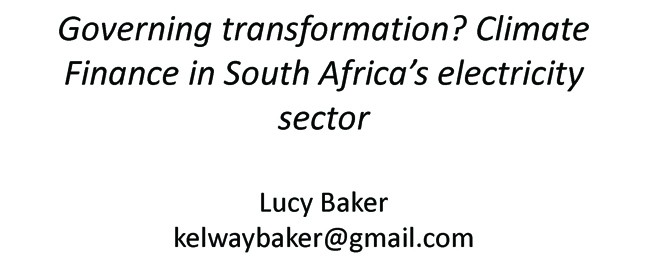Governing transformation? Climate finance in South Africa’s energy sector
Lucy Baker
Abstract:
This paper fuses approaches from socio-technical transitions (Geels and Schot 2007, Smith et al 2005) with political economy perspectives informed by the literature on South Africa’s minerals-energy complex (Fine and Rustomjee 1996). In doing so it generates key insights into governance and policy-making in the electricity sector and contributes to an analytical framework for a problem that is at once political, economic, social and technological. Such a framework allows for the analysis of historical power relations, structural change, the underlying interests of dominant actors and beneficiaries of governance mechanisms and the relationship between state and non-state actors. This approach contributes to a research gap that firstly responds to calls to consider issues of politics in the socio-technical transitions literature
(Meadowcroft 2011) and Goldthau and Sovacool’s (2011:238) finding that the “political economy of energy transitions is a vastly understudied area”. Secondly the transitions literature has mainly focused on OECD countries, particularly Europe and so its consideration of low and middle income countries within the context of a globalised and financially interdependent world is therefore limited , particularly in the case of sub-Saharan Africa.
Using the multi-level perspective on socio-technical transitions, this paper evaluates the role of climate finance in promoting innovation in South Africa’s electricity sector, specifically the case of the Sere Wind Farm and the Upington Solar Power Project. Climate finance in this instance comes from development finance institutions such as the World Bank, African Development Bank and the European Investment Bank; the World Bank-administered Clean Technology Fund (CTF); and bi-lateral donors such as Agence Française de Développement. The renewable energy projects, both 100 MW each, will be connected to the national transmission grid, and are owned by the country’s state-owned monopoly utility Eskom. The paper firstly demonstrates how a ‘niche-level’ initiative in the form of two small renewable energy projects has been used to justify development finance for a major coal-fired power plant. Secondly it finds that the climate finance in question will be of primary benefit to an electricity sector that to date has privileged large energy intensive resource conglomerates, while providing limited benefits for the energy poor. The climate finance has therefore contributed to what can termed, “incremental innovations” (Scrase and Smith 2009:710) rather than to the systematic transformation of an equitable low-carbon energy pathway.
Presentation: Download here: Baker_L – Panel 4
Paper: not available for download
Related Posts
« Previous New Thinking Blog: British energy policy: descending to a combination of pork barrel politics and desperation? Panel 4: The role of governance in accelerating transition towards more integrated, service-oriented infrastructure operation Next »







